The demand for salon chairs in Japan is valued at USD 530.8 million in 2025 and is projected to reach USD 789.5 million by 2035, reflecting a compound annual growth rate of 4.1%. Growth is driven by steady expansion in the beauty and personal care services sector, where salons continue to upgrade equipment to enhance client comfort and operational efficiency. As grooming services diversify and premiumize, demand for modern, ergonomic and durable seating increases across both independent salons and larger chains. Replacement cycles also contribute to rising demand as older equipment is phased out in favor of updated designs. Broader interest in professional-grade furnishings that support workflow, hygiene and space optimization reinforces this upward trajectory across the forecast period.
The market growth curve displays a consistent and gradual upward progression, beginning at USD 435.2 million in earlier years and rising to USD 530.8 million in 2025 before advancing toward USD 789.5 million by 2035. The year-on-year pattern is smooth, with incremental gains observed as values move from USD 552.3 million in 2026 to USD 574.7 million in 2027 and continue to rise at similar intervals. This shape indicates a mature but steadily expanding market driven by ongoing investment in salon infrastructure and evolving service expectations. As operators pursue better client experience, enhanced durability and improved design features, salon chairs maintain stable demand supported by predictable replacement needs and expanding service environments throughout Japan.
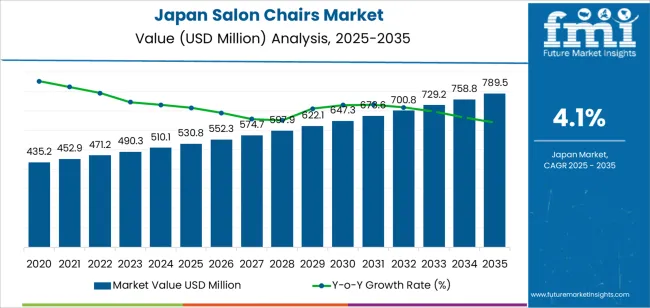
Demand in Japan for salon chairs is projected to grow from USD 530.8 million in 2025 to USD 789.5 million by 2035, reflecting a compound annual growth rate (CAGR) of approximately 4.1%. Starting at USD 435.2 million in 2020, the value rises steadily each year reaching USD 510.1 million in 2024 and then USD 530.8 million in 2025. From 2025 to 2030 the demand is expected to further increase to about USD 622.1 million, and by 2035 the value approaches USD 789.5 million. The growth is driven by the expansion of salon and spa establishments, increasing consumer expenditure on grooming and wellness services, and rising adoption of advanced, ergonomic and premium-quality chairs in urban beauty salons.
Over the forecast period the uplift of USD 258.7 million (from USD 530.8 million to USD 789.5 million) is supported by both volume growth and higher per-unit value. In the early phase volume expansion dominates as more salons open and independent operators upgrade to standard-premium chairs. In the latter part of the decade, value growth becomes more significant as salon chairs gain advanced features such as electric hydraulics, ergonomic design, smart connectivity and antimicrobial upholstery allowing higher average selling prices. These premium upgrades, along with increasing replacement cycles and refurbishment of established salons, reinforce the upward trend toward USD 789.5 million by 2035.
| Metric | Value |
|---|---|
| Industry Value (2025) | USD 530.8 million |
| Forecast Value (2035) | USD 789.5 million |
| Forecast CAGR (2025 to 2035) | 4.1% |
The demand for salon chairs in Japan is driven by growth in the beauty and grooming services industry. The rising number of hair salons, barbershops, and unisex beauty studios across Japan is increasing the need for chairs designed for high turnover, comfort and durability. Urban settings place a premium on chairs that fit smaller spaces while still offering reliable function. Salon owners are investing in chairs that support adjustable height, ergonomic support and ease of cleaning to handle frequent client use. Upgrades in interior design and branding among boutique salons also create demand for chairs that match higher aesthetic standards and client expectations.
Another contributing factor is the increasing focus on salon experience and machinery replacement in Japan. As salons aim to offer premium services and uplift their interior environment, they are replacing older chairs or expanding capacity. The growth in male grooming services, in-shop multi-service formats and independent hairstylists entering the market further broadens buyer segments for salon chairs. Some challenges include rising material and import costs, as well as competition from lower-cost suppliers. Nonetheless the demand for salon chairs in Japan is expected to continue growing at a moderate rate.
The demand for salon chairs in Japan is shaped by chair type diversity and the functionality features required across different salon environments. Chair types include all-purpose, modern, conventional, antique or vintage and other specialty formats, each supporting unique service needs and interior preferences. Functional categories include electric, reclining, hydraulic, heavy-duty and other mechanisms that influence operator control and client comfort. These segments reflect rising expectations for ergonomics, durability and aesthetic compatibility within Japanese salons. As service providers balance efficiency with client experience, the combination of varied chair forms and functional capabilities guides purchasing decisions throughout the professional grooming sector.
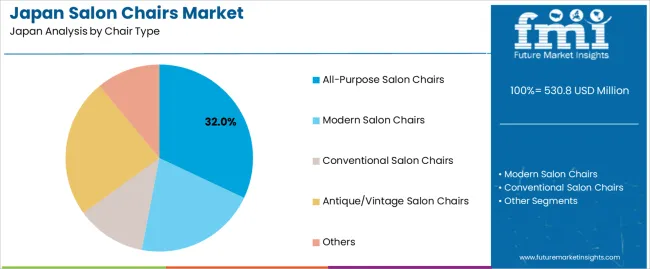
All-purpose salon chairs account for 32% of total demand in Japan. Their leading position reflects the need for versatile seating that supports a wide range of grooming tasks without frequent adjustments or equipment changes. These chairs are used in salons offering haircuts, styling and basic treatments, making them a practical choice for operators who value efficiency. Their adaptable design, stable bases and adjustable components help professionals maintain steady workflow while supporting different client preferences. The straightforward maintenance and long service life associated with all-purpose chairs reinforce adoption across small independent salons and larger service chains.
Demand is further strengthened by the flexibility these chairs offer in compact salon layouts. Many Japanese salons operate in limited spaces where multi-functional equipment reduces clutter and improves movement. The ability to integrate essential adjustments while maintaining a clean aesthetic helps ensure consistent use. Manufacturers offer all-purpose models in varied designs and upholstery options, enabling owners to match interior themes without sacrificing practicality. As salons seek reliable, cost-effective solutions, all-purpose chairs remain a core selection for daily operations.

Electric functionality accounts for 39.0% of total demand for salon chairs in Japan. This share reflects increasing interest in powered adjustments that reduce operator strain and improve client positioning accuracy. Electric systems enable smooth height, tilt and backrest movements, which streamline complex grooming and treatment procedures. Salons offering premium services often prioritize electric chairs to enhance comfort and precision. Their controlled movements support detailed tasks and help maintain consistent posture for stylists working extended hours.
Demand for electric features is also influenced by expectations for modern, efficient equipment in competitive urban salon markets. Electric chairs help create a professional environment while enabling smoother transitions between service steps. Their quiet operation and stable mechanisms support a calm client experience. As salons update equipment to align with contemporary service standards, electric functionality remains a preferred choice for owners seeking greater control, durability and improved workflow across a range of grooming applications.
Demand for salon chairs in Japan is growing modestly as the beauty and grooming service sector expands, especially in urban and boutique salon formats. Japanese salon operators are investing in high-quality, ergonomically advanced chairs to enhance client comfort and stylist productivity. Premiumisation of salon experiences and growth in male grooming and wellness-focussed salons also contribute to demand. At the same time, smaller salons and mobile operators may delay investment due to cost and space constraints, so growth is concentrated in select segments of the salon-furniture market.
One key trend in Japan is the shift toward compact, high-tech, and design-focused salon chairs that suit smaller urban salon spaces and premium service offerings. Industry insights indicate that Japanese salons favour chairs with features such as hydraulic or electric height adjustment, reclining capabilities, and sleek styling to match brand image and client expectations. The trend toward hybrid salons offering multiple services (hair, beauty, aesthetics) further pushes demand for versatile, multi-purpose chairs that support various treatments.
An important opportunity exists in the growing segments of boutique salons, wellness-focussed studios, and male grooming spaces in Japan. These operators often seek differentiated equipment that offers superior comfort, strong aesthetics and brand alignment. Suppliers who provide customisation, high-end finishes and integrated features (e.g., premium upholstery, built-in controls) are well placed. Furthermore, as e-commerce and direct-import channels expand, international brands that offer compact units with quality and style may capture demand in Japan’s competitive salon furniture market.
Despite favourable dynamics, there are several challenges-facing the salon-chair market in Japan. First, high upfront cost for premium chairs may deter smaller salons or start-ups with limited budgets. Second, limited space in many Japanese salon locations restricts installation of larger or heavy chairs, especially in dense urban zones. Third, the market is fragmented with many independent operators, making distribution and brand-differentiation harder for suppliers. These factors combine to moderate how quickly salon chair upgrades occur across all salon segments in Japan.
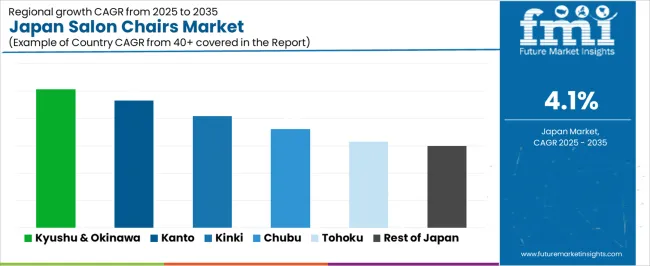
| Region | CAGR (%) |
|---|---|
| Kyushu & Okinawa | 5.1% |
| Kanto | 4.7% |
| Kinki | 4.1% |
| Chubu | 3.6% |
| Tohoku | 3.2% |
| Rest of Japan | 3.0% |
Demand for salon chairs in Japan is increasing across regions, with Kyushu and Okinawa leading at 5.1%. Growth in this region reflects steady expansion of beauty salons and rising refurbishment cycles among small and mid-sized establishments. Kanto follows at 4.7%, supported by dense urban markets and strong demand from high-volume salons seeking durable seating solutions. Kinki records 4.1%, shaped by consistent salon activity across major cities. Chubu grows at 3.6%, driven by moderate commercial demand and steady adoption among regional salon chains. Tohoku reaches 3.2%, reflecting gradual expansion of beauty service outlets. The rest of Japan posts 3.0%, showing stable but slower uptake across smaller communities.
Kyushu & Okinawa is projected to grow at a CAGR of 5.1% through 2035 in demand for salon chairs. The region’s beauty and personal care industry, particularly in Fukuoka, is expanding with new salons and wellness centers adopting ergonomic, durable, and stylish seating solutions. Rising consumer demand for comfort and premium salon experiences drives adoption. Manufacturers and suppliers in Kyushu & Okinawa are providing adjustable, multifunctional chairs to meet professional requirements. Urban expansion, growth in spa and salon services, and increasing consumer focus on comfort and aesthetics support steady growth in the salon chair segment.
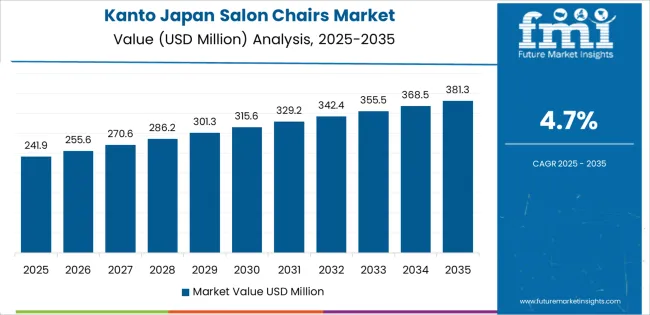
Kanto is projected to grow at a CAGR of 4.7% through 2035 in demand for salon chairs. As Japan’s economic and urban hub, including Tokyo, the region exhibits high adoption of modern, ergonomic, and multifunctional salon seating. Rising beauty service demand and premium salon experiences drive market growth. Manufacturers in Kanto provide advanced designs with adjustable height, recline, and durability features. Retailers and distributors expand availability to meet professional and consumer needs. The combination of urban population density, salon expansion, and consumer preference for comfort and functionality ensures steady growth of salon chair demand in Kanto.
Kinki is projected to grow at a CAGR of 4.1% through 2035 in demand for salon chairs. The region’s beauty and wellness sector, particularly in Osaka and Kyoto, increasingly adopts multifunctional and ergonomic salon seating solutions. Rising consumer expectations for comfort, style, and hygiene drive adoption. Manufacturers in Kinki provide innovative designs with adjustable features suitable for diverse salon operations. Urban salons and small-scale wellness centers prioritize durable, easy-to-clean chairs to improve service quality. The combination of consumer demand, professional requirements, and regional industrial manufacturing capabilities supports steady growth in the salon chair segment in Kinki.
Chubu is projected to grow at a CAGR of 3.6% through 2035 in demand for salon chairs. The region’s urban centers, particularly Nagoya, are integrating ergonomic and adjustable chairs in beauty salons, wellness centers, and barber shops. Rising consumer demand for quality, comfort, and functional design drives adoption. Manufacturers and suppliers in Chubu are producing durable and multifunctional chairs to meet professional needs. The combination of urbanization, salon expansion, and growing awareness of salon ergonomics ensures steady adoption of salon chairs across commercial facilities and small-scale beauty establishments in the Chubu region.
Tohoku is projected to grow at a CAGR of 3.2% through 2035 in demand for salon chairs. The region’s smaller cities and towns are increasingly adopting ergonomic and durable seating solutions in beauty salons, barber shops, and wellness centers. Rising consumer expectations for comfort, hygiene, and service quality drive adoption. Manufacturers provide adjustable and multifunctional chairs suitable for limited salon spaces. Growing awareness of professional beauty standards and comfort-focused services supports steady growth in salon chair demand across Tohoku, particularly in semi-urban and small-scale commercial establishments throughout the region.
The Rest of Japan is projected to grow at a CAGR of 3.0% through 2035 in demand for salon chairs. Smaller towns and rural areas are gradually adopting modern and ergonomic seating solutions in salons, wellness centers, and barber shops. Rising awareness of comfort, hygiene, and quality service drives adoption. Manufacturers and distributors provide durable, multifunctional chairs suitable for smaller operations. The combination of regional salon expansion, professional service requirements, and consumer demand for ergonomic seating supports steady growth in salon chair adoption across less urbanized areas of Japan.
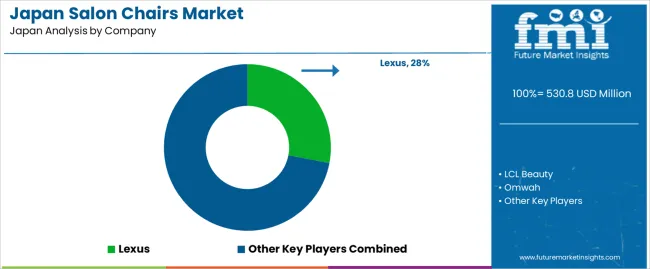
The demand for salon chairs in Japan is being driven by rising consumer spending on personal grooming, an expanding beauty-service industry and increased urbanisation. As more salons open and franchise chains expand, there is growing need for modern, ergonomic seating that enhances the client experience and supports stylist productivity. Features such as hydraulic lifts, reclining functions and advanced materials are becoming more common. The influence of social media on beauty trends also raises expectations for salon aesthetics and comfort. In addition, the shift toward men’s grooming services and multi-service salons (hair, nails, makeup) contributes further to the upgrade of equipment including chairs.
Key players shaping the salon chair sector in Japan include Lexus (via LCL Beauty), Omwah, Icarus, Memphis and Delano. These firms design and supply chairs tailored to the Japanese market in terms of style, compactness and durability suitable for high-usage salon environments. They partner with salon chains and equipment distributors to supply seating that meets hygiene, space efficiency and design requirements specific to Japan. Through product customisation, local service support and collaboration with salon owners, these companies influence how seating solutions are selected and deployed across the Japanese salon sector.
| Items | Values |
|---|---|
| Quantitative Units (2025) | USD million |
| Chair Types | All-Purpose Salon Chairs, Modern Salon Chairs, Conventional Salon Chairs, Antique/Vintage Salon Chairs, Others |
| Functionality | Electric, Reclining, Hydraulic, Heavy Duty, Others |
| Distribution Channels | Direct Sales, Hypermarkets/Supermarkets, Specialty Stores, Distributors/Wholesalers, Online Stores |
| Regions Covered | Kyushu & Okinawa, Kanto, Kinki, Chubu, Tohoku, Rest of Japan |
| Countries Covered | Japan |
| Key Companies Profiled | Lexus, LCL Beauty, Omwah, Icarus, Memphis, Delano |
| Additional Attributes | Dollar by sales by chair type, functionality, and distribution channel; regional CAGR and penetration trends; commercial vs boutique salon adoption; ergonomic and hydraulic/electric feature uptake; premiumisation of chairs; replacement cycles and refurbishment trends; growth across urban, semi-urban, and smaller cities; integration with salon design, aesthetics, and multi-service environments. |
The demand for salon chairs in Japan is estimated to be valued at USD 530.8 million in 2025.
The market size for the salon chairs in Japan is projected to reach USD 789.5 million by 2035.
The demand for salon chairs in Japan is expected to grow at a 4.1% CAGR between 2025 and 2035.
The key product types in salon chairs in Japan are all-purpose salon chairs, modern salon chairs, conventional salon chairs, antique/vintage salon chairs and others.
In terms of functionality, electric segment is expected to command 39.0% share in the salon chairs in Japan in 2025.






Our Research Products

The "Full Research Suite" delivers actionable market intel, deep dives on markets or technologies, so clients act faster, cut risk, and unlock growth.

The Leaderboard benchmarks and ranks top vendors, classifying them as Established Leaders, Leading Challengers, or Disruptors & Challengers.

Locates where complements amplify value and substitutes erode it, forecasting net impact by horizon

We deliver granular, decision-grade intel: market sizing, 5-year forecasts, pricing, adoption, usage, revenue, and operational KPIs—plus competitor tracking, regulation, and value chains—across 60 countries broadly.

Spot the shifts before they hit your P&L. We track inflection points, adoption curves, pricing moves, and ecosystem plays to show where demand is heading, why it is changing, and what to do next across high-growth markets and disruptive tech

Real-time reads of user behavior. We track shifting priorities, perceptions of today’s and next-gen services, and provider experience, then pace how fast tech moves from trial to adoption, blending buyer, consumer, and channel inputs with social signals (#WhySwitch, #UX).

Partner with our analyst team to build a custom report designed around your business priorities. From analysing market trends to assessing competitors or crafting bespoke datasets, we tailor insights to your needs.
Supplier Intelligence
Discovery & Profiling
Capacity & Footprint
Performance & Risk
Compliance & Governance
Commercial Readiness
Who Supplies Whom
Scorecards & Shortlists
Playbooks & Docs
Category Intelligence
Definition & Scope
Demand & Use Cases
Cost Drivers
Market Structure
Supply Chain Map
Trade & Policy
Operating Norms
Deliverables
Buyer Intelligence
Account Basics
Spend & Scope
Procurement Model
Vendor Requirements
Terms & Policies
Entry Strategy
Pain Points & Triggers
Outputs
Pricing Analysis
Benchmarks
Trends
Should-Cost
Indexation
Landed Cost
Commercial Terms
Deliverables
Brand Analysis
Positioning & Value Prop
Share & Presence
Customer Evidence
Go-to-Market
Digital & Reputation
Compliance & Trust
KPIs & Gaps
Outputs
Full Research Suite comprises of:
Market outlook & trends analysis
Interviews & case studies
Strategic recommendations
Vendor profiles & capabilities analysis
5-year forecasts
8 regions and 60+ country-level data splits
Market segment data splits
12 months of continuous data updates
DELIVERED AS:
PDF EXCEL ONLINE
Demand Signal Repository Solutions Market Size and Share Forecast Outlook 2025 to 2035
Demand Side Management Market Size and Share Forecast Outlook 2025 to 2035
Demand Response Market Analysis - Size, Share, and Forecast Outlook 2025 to 2035
North America Shipping Supplies Market Trends – Innovations & Growth 2024-2034
Demand of Kozani Saffron in Greece Analysis - Size, Share & Forecast 2025 to 2035
Demand of No-acid Whey Strained Dairy Processing Concepts in European Union Size and Share Forecast Outlook 2025 to 2035
Demand for Bronte Pistachio in Italy Analysis - Size, Share & Forecast 2025 to 2035
Demand and Trend Analysis of Gaming Monitor in Western Europe Size and Share Forecast Outlook 2025 to 2035
Demand and Trend Analysis of Gaming Monitor in Korea Size and Share Forecast Outlook 2025 to 2035
Demand and Trend Analysis of Gaming Monitor in Japan Size and Share Forecast Outlook 2025 to 2035
Glycine Soja (Soybean) Seed Extract Market Size and Share Forecast Outlook 2025 to 2035
Demand and Trend Analysis of Yeast in Japan - Size, Share, and Forecast Outlook 2025 to 2035
Demand of Pistachio-based desserts & ingredients in France Analysis - Size, Share & Forecast 2025 to 2035
Western Europe Men’s Skincare Market Analysis – Forecast 2023-2033
Demand and Trends Analysis of Stevia in Japan Size and Share Forecast Outlook 2025 to 2035
Japan Women’s Intimate Care Market Trends – Growth & Forecast 2024-2034
Demand and Trend Analysis of Fabric Stain Remover in Korea Size and Share Forecast Outlook 2025 to 2035
Demand and Sales Analysis of Paper Cup in Korea Size and Share Forecast Outlook 2025 to 2035
Demand and Sales Analysis of Paper Cup in Western Europe Size and Share Forecast Outlook 2025 to 2035
Demand of MFGM-enriched Powders & RTDs in European Union Size and Share Forecast Outlook 2025 to 2035

Thank you!
You will receive an email from our Business Development Manager. Please be sure to check your SPAM/JUNK folder too.
Chat With
MaRIA